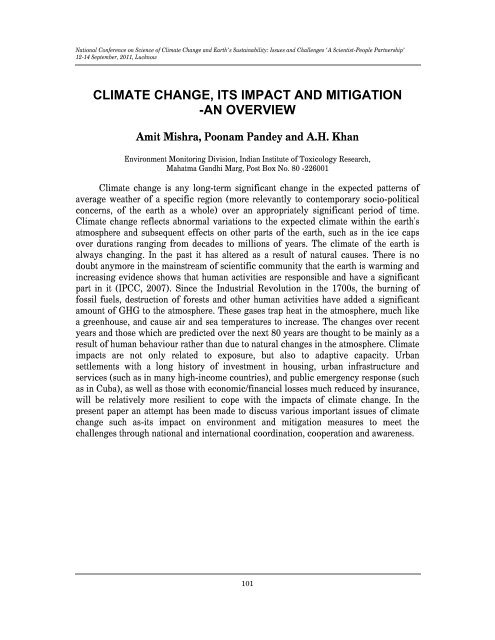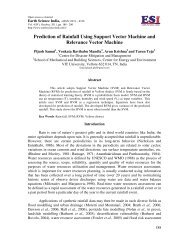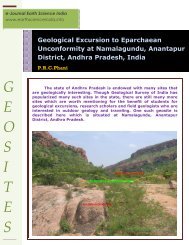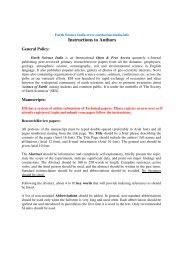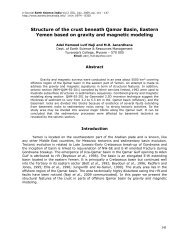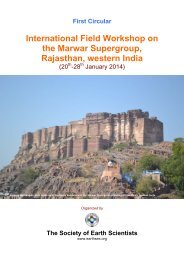12-14 September, 2011, Lucknow - Earth Science India
12-14 September, 2011, Lucknow - Earth Science India
12-14 September, 2011, Lucknow - Earth Science India
You also want an ePaper? Increase the reach of your titles
YUMPU automatically turns print PDFs into web optimized ePapers that Google loves.
National Conference on <strong>Science</strong> of Climate Change and <strong>Earth</strong>’s Sustainability: Issues and Challenges ‘A Scientist-People Partnership’<br />
<strong>12</strong>-<strong>14</strong> <strong>September</strong>, <strong>2011</strong>, <strong>Lucknow</strong><br />
CLIMATE CHANGE, ITS IMPACT AND MITIGATION<br />
-AN OVERVIEW<br />
Amit Mishra, Poonam Pandey and A.H. Khan<br />
Environment Monitoring Division, <strong>India</strong>n Institute of Toxicology Research,<br />
Mahatma Gandhi Marg, Post Box No. 80 -226001<br />
Climate change is any long-term significant change in the expected patterns of<br />
average weather of a specific region (more relevantly to contemporary socio-political<br />
concerns, of the earth as a whole) over an appropriately significant period of time.<br />
Climate change reflects abnormal variations to the expected climate within the earth's<br />
atmosphere and subsequent effects on other parts of the earth, such as in the ice caps<br />
over durations ranging from decades to millions of years. The climate of the earth is<br />
always changing. In the past it has altered as a result of natural causes. There is no<br />
doubt anymore in the mainstream of scientific community that the earth is warming and<br />
increasing evidence shows that human activities are responsible and have a significant<br />
part in it (IPCC, 2007). Since the Industrial Revolution in the 1700s, the burning of<br />
fossil fuels, destruction of forests and other human activities have added a significant<br />
amount of GHG to the atmosphere. These gases trap heat in the atmosphere, much like<br />
a greenhouse, and cause air and sea temperatures to increase. The changes over recent<br />
years and those which are predicted over the next 80 years are thought to be mainly as a<br />
result of human behaviour rather than due to natural changes in the atmosphere. Climate<br />
impacts are not only related to exposure, but also to adaptive capacity. Urban<br />
settlements with a long history of investment in housing, urban infrastructure and<br />
services (such as in many high-income countries), and public emergency response (such<br />
as in Cuba), as well as those with economic/financial losses much reduced by insurance,<br />
will be relatively more resilient to cope with the impacts of climate change. In the<br />
present paper an attempt has been made to discuss various important issues of climate<br />
change such as-its impact on environment and mitigation measures to meet the<br />
challenges through national and international coordination, cooperation and awareness.<br />
101


